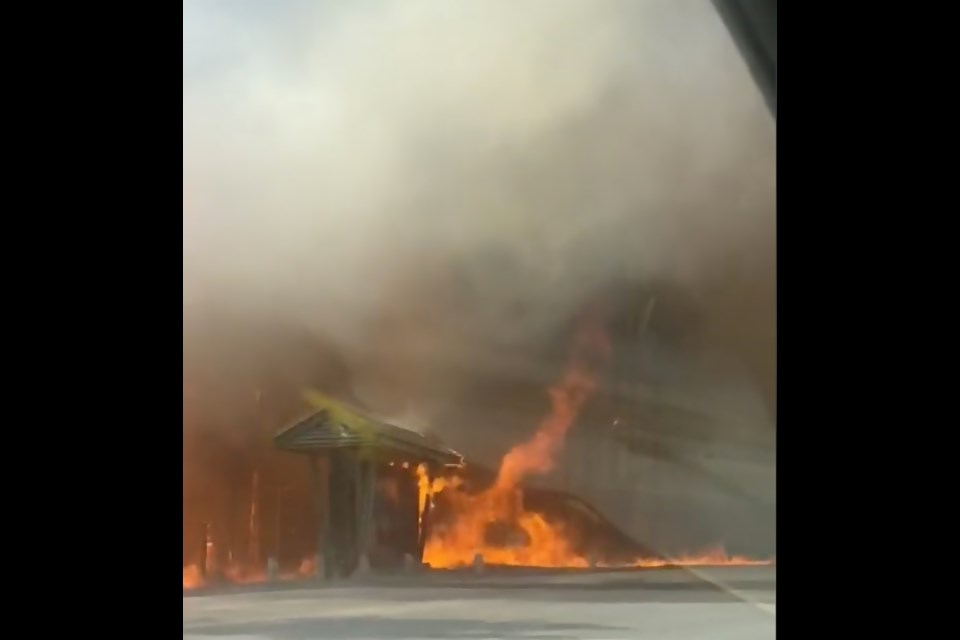BANFF – The iconic Bill Peyto sign on Banff Avenue that welcomed millions of visitors a year to the tourist town was destroyed when a prescribed fire got out of control as winds whipped up unexpectedly on Wednesday afternoon (May 3).
The prominent and highly visible sign, which was installed by Parks Canada in the 1980s, featured a photo of Ebenezer William (Bill) Peyto, a legendary Banff National Park pioneer and former warden recognized for his famed moustache, cowboy hat and pipe.
Retired Banff National Park warden and Canmore resident, Don Mickle, said Peyto is a remarkable historical figure, noting he was was sorry and disappointed to hear news that the well-loved sign had burned to the ground.
“The sign was really an icon for the warden service and park itself … the history of the park,” said Mickle, who worked for the Parks Canada warden service for 34 years before retiring in 2003.
“They should replace it, for sure.”
@ropeadopeyyc Driving past a huge fire on the way home from a job site! #foryoupage #trending #fyp #scarytiktoks #wildfire #firefighter #alberta #banff #staysafe ♬ Summermode - Official Sound Studio
Peyto was a legendary mountain guide, horse outfitter, packer, trapper, prospector and one of the earliest park wardens of Banff National Park. Peyto Glacier and Peyto Lake are named in his honour, while Wild Bill's Legendary Saloon in downtown Banff is a salute to the pioneer as well.
The colourful stories about Peyto’s exploits, embellished or not, are the stuff of legends – from the one where he raised two orphaned cougar kittens in a secluded cabin to strapping a lynx to his back and letting it go in a crowded Banff bar.
“The story goes he had the lynx strapped on his back and he cleared out the bar,” said Mickle, who was a cultural resources expert at the time of his retirement from Banff National Park.
“I think it was true, but I think there was probably a bit of legend around it as well.”
Peyto was born in England in 1869 and immigrated to Canada in 1887. He headed west, where he initially worked as a railway labourer. By the mid-1890s, his expertise and knowledge as a mountain guide, horse outfitter and packer had become well known.
He worked as a park warden in Banff National Park from 1913, guarding wildlife and nabbing poachers, until his retirement in 1936, with his duties interrupted by his service in the First World War. He died in 1943.
Retired park warden Scott Ward, who had a 36-year career with the warden service before retiring in 2005, said he, too, was disappointed the sign was destroyed in the unintentional fire.
“I’m just saddened by the loss of the iconic sign that represented a connection to our Rockies' history,” said Ward, a member of the band The Wardens, who penned and recorded the tune Wild Bill in honour of Peyto. “Hopefully something similar will replace it."
On Wednesday afternoon (May 3), flames from Parks Canada’s prescribed fire operations at Compound Meadows, located between Banff Avenue, Compound Road and the Trans-Canada Highway – jumped from the west side of Banff Avenue to the east side as winds unexpectedly whipped up at around 4 p.m.
Both Banff Rocky Mountain Resort and Mount View Barbecue, which is a private event and reception venue, were evacuated as a precaution, while at least 10 horses from the corrals were moved by trailer to the safety of the Banff Trail Riders barns on the south side of the Bow River by the recreation grounds.
With the assistance of four helicopters bucketing water on the blaze, fire crews worked to douse the flames from late afternoon until late in the evening, and the out-of-control fire was considered ‘being held’ by 11 p.m. on Wednesday night.
Crews and helicopters were on scene all day Thursday (May 4), putting out any remaining hot spots and making sure the fire remained contained at the three hectares outside the prescribed fire unit. Rain in the afternoon also helped with the fire suppression efforts. The fire was deemed "under control" on Saturday evening.
At least three sheds at the horse corrals were destroyed, including one that had treasured items, such as historic saddles owned by the prominent Brewster family.
The Peyto sign on Banff Avenue, along with a second Bill Peyto sign on the Norquay Road at the western entrance to town, were both slated for removal in 2015 as part of the Town of Banff’s $2.2-million Wayfinding project.
They were to be replaced with new signs intended to grab the attention of tourists as they arrive in Canada’s premiere tourist town. The Bill Peyto sign on Norquay Road was removed and replaced with the so-called popular "Banff" sign, but the one on Banff Avenue never was.
Warden service alumni protested removal of the signs at that time.
"They left it eventually because there was enough protest," said Mickle.




